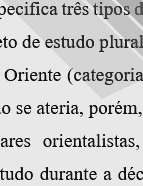

................................
Their first studies (Tengarrinha, "Tradição e Revolução I - As Reformas Económicas de Mouzinho da Silveira" [“Tradition and Revolution I - Mouzinho da Silveira's Economic Reforms”], 1961; Sá, Perspectivas do Século XIX [Nineteenth Century Perspectives], 1964), as will be seen further ahead, offer the reader a different vision of the 19th century from that advanced by the Marxist historians of the 1940s, while establishing the first outlines of several study areas, such as the history of the workers' movement or the history of social movements, and performing new analyses of several cultural objects and practices, such as the press and reading (Tengarrinha, História da Imprensa Periódica Portuguesa [History of the Portuguese Periodical Press], 1965; Tengarrinha, A novela e o leitor português [The novel and the Portuguese reader], 1973).
Finally, the third phase of Marxist historiography in Portugal began in the first half of the 1970s, extending throughout that same decade. Although most of the works of the historians involved in this third phase were published after 1974 and are therefore not discussed at length herein, it is nevertheless important to mention their emergence. While some of the contributions of these new historians gave continuity to former concerns, others severed all links with the Marxist past in Portugal. This shift was all the more visible in authors whose political career had been detached from the PCP - when not deliberately against it - and close to the extreme left currents that had developed with the outbreak of the Sino-Soviet conflict, with Francisco Martins Rodrigues' split from the PCP and the radicalisation of the student movement. Claiming a purer and more consistent interpretation of Marxism than that which was permitted within the sphere of the PCP, authors such as César Oliveira, Manuel Villaverde Cabral, Fernando Medeiros and José Pacheco Pereira, albeit with divergent political-ideological references, sought to develop a historiography particularly aimed at the study of the workers' movement, building on the work of Sá and Tengarrinha, but advancing in the study of the 20th century (Pereira, As lutas operárias contra a carestia de vida em Portugal [Workers' struggles against the high cost of living in Portugal], 1971; Oliveira, O operariado e a República Democrática [The workers and the Democratic Republic] , 1972; Cabral, O desenvolvimento do capitalismo em Portugal [The development of capitalism in Portugal] 1976; Medeiros, A sociedade e a economia nas origens do Salazarismo [Society and economy at the root of Salazarism], 1978).
